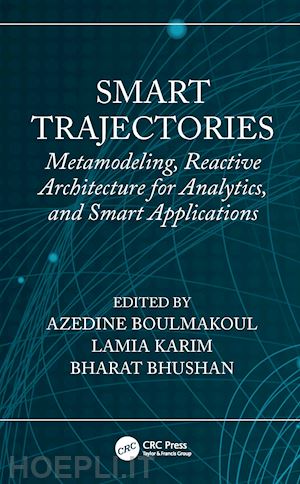Azedine Boulmakoul is a Professor in the Department of Computer Science at FST Mohammedia- Hassan II University of Casablanca, where he has been since 1994. He received his PhD and hold « Habilitation à Diriger des Recherches » from the Claude Bernard University of Lyon in 1990 and 1994 respectively. In 1987, he was lecturer assistant at the ENTPE School (Ecole Nationale des Travaux Public de l’Etat Lyon France). For the period 1987-1988, he was appointed Assistant Professor at INSA de Lyon. Between 1987 and 1994, he joined the National Institute for Research on Transportation and Safety (INRETS-Paris, www.ifsttar.fr) for Real Time intelligent systems' research development. He is President of Innovative Open Spatial Information Systems Association: www.iosis.ma. He has received many awards for his contributions to research and business development, including French Academy of Sciences, R&D Maroc Awards and Distinction Medal from Moroccan Ministry of Higher Education and Research, Distinction Medal from Istanbul International Inventions. He also contributes to intellectual property of industrial patents. Several years in R&D and in studies and business consulting. He has chaired several conferences and program committees. He is the author of over three hundred papers (in books, journals and conferences, patents, ...) on computer science. He holds ten patents deriving from his research. His research interests include intelligent real time systems, logic for artificial intelligence, fuzzy systems theory, distributed frameworks, data analytics, complex systems, information systems engineering, transportation and computer engineering. In his spare time, he enjoys playing karate (3rd degree black belt), running, cooking, and reading. Amazed by universe beauty and likes to walk in mountains and listen to silence to write a poem. Lamia Karim is a professor of computer science at Hassan First University of Settat, Ecole Nationale des Sciences Appliquées, Berrechid, Morocco. She is Huawei certified instructor in big data from may 2022. In 2020, she obtained the University Habilitation diploma at ENSAB Hassan first University. In 2015, she obtained the PhD degree in Computer Science at the Faculty of Science and Technology of Mohammedia, Hassan II University of Casablanca, Morocco. She obtained Masters of Science and Technical in computer Sciences in 2006 from Faculty of Sciences and Technologies (FSTM), Morocco, and computer engineer degree in software engineering from National School of Mineral Industry (ENIM), Rabat, Morocco in 2008. Her research interest includes spatial data engineering, mobile and web geo-computing, real time intelligent transportation systems, complexes systems computing, soft computing, reactive intelligent systems. She is general secretary of Innovative Open Spatial Information Systems Association: www.iosis.ma. She has been the session Chair, and Panelist in Several Conferences. She earned numerous international certifications such as Microsoft Certified Technology Specialist (MCTS), Cisco Certified Network Associate (CCNA), and International Business Machines Corporation (IBM). She has published more than 80 research papers in various renowned International conferences and SCI indexed journals. She has served as a Reviewer for several reputed international journals. She holds several national and international patents (OMPIC and WIPO). She has contributed with several book chapters in various books. She has co-edited the book Internet of Things: Frameworks for Enabling and Emerging Technologies (CRC Press, Taylor & Francis Group) and is currently in the process of editing books from the most famed publishers like Elsevier, and CRC Press. Dr. Bharat Bhushan is an Assistant Professor of Department of Computer Science and Engineering (CSE) at School of Engineering and Technology, Sharda University, Greater Noida, India. He is an alumnus of Birla Institute of Technology, Mesra, Ranchi, India. He received his Undergraduate Degree (B-Tech in Computer Science and Engineering) with Distinction in 2012, received his Postgraduate Degree (M-Tech in Information Security) with Distinction in 2015 and Doctorate Degree (PhD Computer Science and Engineering) in 2021 from Birla Institute of Technology, Mesra, India. He earned numerous international certifications such as CCNA, MCTS, MCITP, RHCE and CCNP. In the last three years, he has Published more than 80 research papers in various renowned international conferences and SCI indexed journals including Wireless Networks (Springer), Wireless Personal Communications (Springer), Sustainable Cities and Society (Elsevier) and Emerging Transactions on Telecommunications (Wiley). He has contributed with more than 25 book chapters in various books and has edited 11 books from the most famed publishers like Elsevier, IGI Global, and CRC Press. He has served as a Reviewer/Editorial Board Member for several reputed international journals. In the past, he












